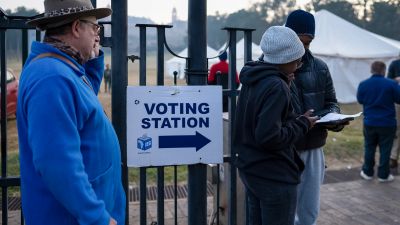
In a new global report on democracy, Africa accounts for 24 per cent of the countries making progress – most notably, Botswana and South Africa in credible elections.
By Conrad Onyango, bird story agency
Botswana and South Africa have been listed among countries in Africa that have made the most gains in democracy, after citizens used the ballot box to break long-standing one-party dominance in both nations. The Global State of Democracy 2025 report by International Institute for democracy and electoral assistance (International IDEA), singles out the two countries for historic elections in 2024 that redefined their political trajectories.
“Botswana and South Africa have both experienced consistent advances over the past five years in credible elections and, in 2024, held polls that resulted in historic changes,” according to authors of the report.
Voters are proving that entrenched power can be challenged peacefully, and that credible elections remain the cornerstone of democracy in Africa.
In Botswana, voters ended the Botswana Democratic Party’s 58-year grip on power, ushering in the country’s first peaceful transfer of leadership since independence in 1966. South Africans, on the other end, dealt the African National Congress(ANC) its first loss of an outright majority since the end of apartheid, forcing the creation of a national coalition government unprecedented in the nation’s democratic history. The ANC’s fall below 50 per cent has been viewed as both a political shock and a democratic milestone, signalling a more competitive system where voters have the biggest say.
Observers credited Botswana with the largest improvement on the Credible Elections index between 2019 and 2024. Among key reforms recorded over the five-year period include a sharp rise in polling stations at home and abroad, declaration of two public holidays to maximise turnout, and nationally televised debates that gave voters a chance to scrutinise candidates.
“While observers also cited challenges—for example, with communication and the appointment of election authorities—they commended Botswana for holding transparent elections,” said authors of the report.
The Credible Elections index measure fairness in registration, campaigning, voter access, intimidation and counting. Apart from Botswana and South Africa, two other African countries made bigger milestones in this index. Chad experienced political openings widening after decades of contested transitions as Mauritius, was commended for a professional electoral commission and a peaceful atmosphere.
Over the last decade, Kenya has also shown strides in bolstering democracy beyond Kenya’s borders, with the country experiencing a rise in diapora community active participation in electoral process
Dr. Linda Adhiambo Oucho, a migration expert and Executive Director of the African Migration and Development Policy Centre (AMADPOC) said over the years, Kenyans in the diaspora have been pushing to be part of the process even at a time they didn’t have the political right to vote.
“It was very interesting how they {Kenyans in Diaspora} talked about what was put very interestingly as political remittances,” Oucho explained, recalling the early stages of developing Kenya’s diaspora policy, which began taking shape in 2014 after extensive consultations on how Kenyans abroad wanted their rights upheld.
In 2025 Kenyans living and working abroad are beginning to influence political direction. Linda said the diaspora are heavily involved in the digital space to hold the government accountable.
“They are joining forces with Gen Z to push the political agenda and ensure the right person is in position, with votes coming from abroad and within the country. This joining of forces is something we’ve never seen before and it signals that politically, democratically, things are shifting,” said Dr. Linda.
Her sentiments are echoed by Prof. Dr. Rainer Bauböck, a political scientist and migration researcher, who affirmed Cape Verde has also over the years firmed up diaspora inclusion in elections to strengthen the country’s democracy and institutional legitimacy.
“In Cape Verde, voting approaches have contributed to democracy’s resilience effectively for 15 years. By ensuring accessibility mechanisms for diaspora participation, states demonstrate that all citizens are equally important. That inclusiveness reduces suspicions of exclusion, making the system more resilient,” said Bauböck.
To mark the 18th International Day of Democracy in 2025, themed “From Voice to Action”, United Nations Secretary-General António Guterres praised “the courage of people everywhere who are shaping their societies through dialogue, participation, and trust.” He, however, sounded an alarm.
“In a time of shrinking civic space and rising disinformation, building trust, dialogue, and shared decision-making is more urgent than ever,” said Guterres.
Under Access to Justice Index, Gambia stood out for strengthening its justice institutions, after ECOWAS backed the creation of a special tribunal to prosecute crimes committed under former president Yahya Jammeh’s rule between 1994–2017. The government’s acceptance of nearly all recommendations from the Truth, Reconciliation and Reparations Commission has been seen as turning tide of accountability in the country.
“The coming years will be critical in assessing the extent to which these commitments are implemented and whether they translate into lasting institutional reform and justice for victims,” said authors of the report.
The continent’s civic space, however presents a mixed picture. According to the report, while Africa accounted for 58 per cent of global declines in civic engagement and civil society, It had six countries of the world’s 20 highest scores for civic engagement. These are Botswana, Gabon, Ghana, Mauritius, Senegal and South Africa. Civic Engagements also improved in Malawi and Zambia with high civil society activities.
bird story agency

Leave a Reply